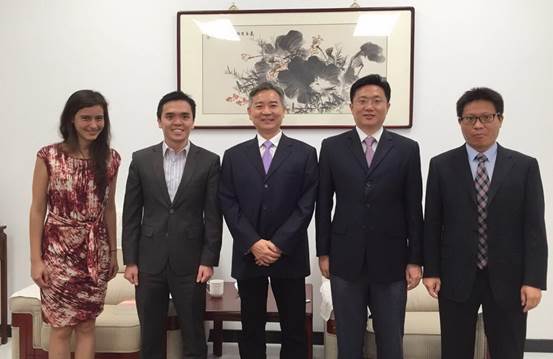Head of Economic Research Department Xu Hongcai Meets with Deputy Chief of Mission ANG Wee Keong of Singapore Embassy in China
- Time:2015-09-10
- source:CCIEE
On the afternoon of 10 September 2015, Head of CCIEE Economic Research Department Xu Hongcai met, at the Center, with Deputy Chief of Mission ANG Wee Keong and Second Secretary Claire Soon Jing Min of the Singapore Embassy in China. Also present at the meeting were Reform and Opening-up Division Chief Zhang Huanbo and Macroeconomy Division Chief Liu Xiangdong of the Department.

Mr. Xu Hongcai introduced the work of CCIEE and analyzed the major issues and challenges in today’s economic development. He stated that CCIEE has conducted many trailblazing researches and exchanges on, among others, global economy, major national strategies, regional development plans and institutional innovation. He said that China is in a process of economic transformation, upgrading and restructuring. While maintaining a medium-to-high economic growth rate, we have improved the economic structure and development quality. Accelerating international cooperation in production capacity is thus of great significance, where Chinese enterprises with comparative advantages could optimize their presence in the global industrial chain. They should not only create job opportunities for local communities, but also pay attention to environmental protection and contribute to local economic development. ANG Wee Keong also recognized the close ties between our two countries. He said that Singapore was the first Asian country to enter into an independent comprehensive free trade agreement (FTA) with China and is China’s largest source of foreign investment. Building on the successful collaboration between the two sides in industrial parks and eco-cities, Singapore looks forward to taking an active part in the “Belt and Road” initiative and intensifying its cooperation with China in aviation, e-commerce and logistics. Particularly, they hope to upgrade bilateral FTA with China at an early date. The two sides agreed to maintain close contact and increase exchanges and cooperation to bring into greater play the constructive role of think tanks in deepening bilateral trade and economic cooperation.
